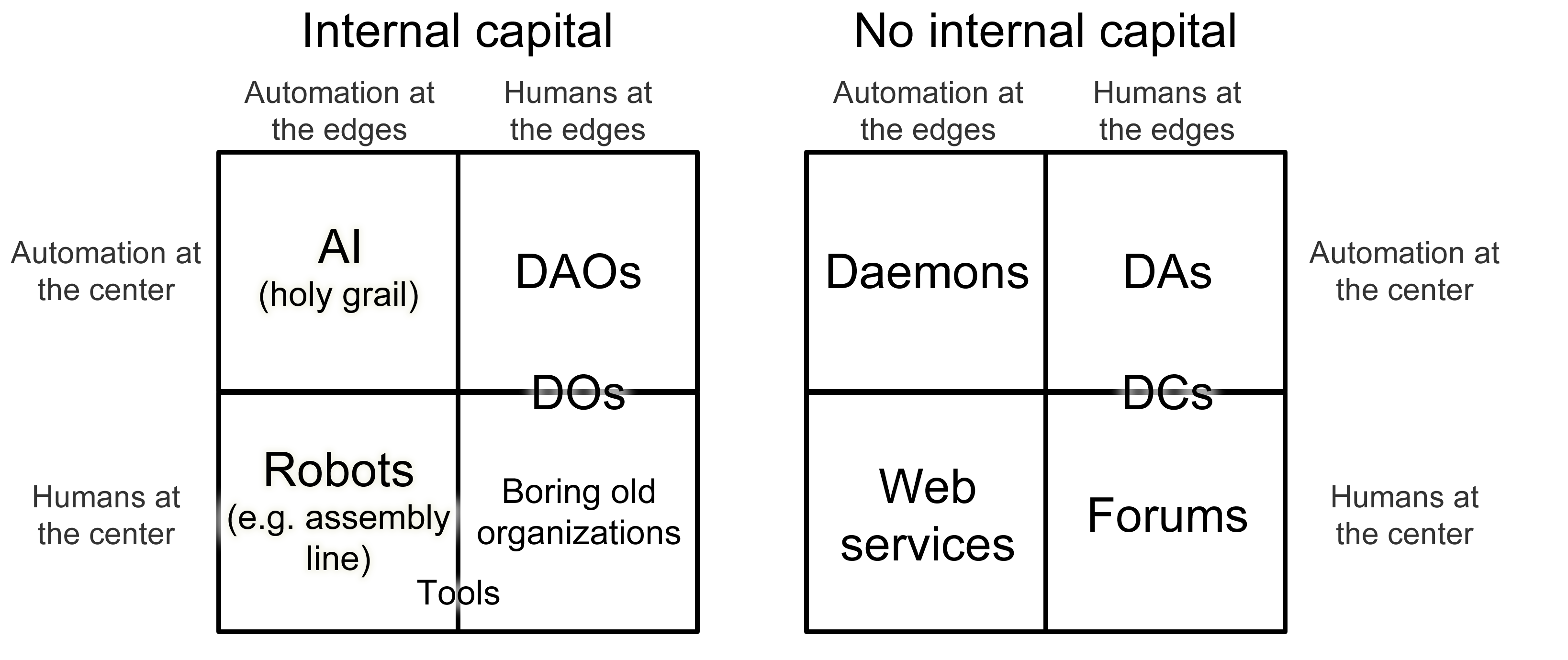For over a year, the Bitcoin world has been intrigued with the concept of Decentralized Autonomous Organizations - quasi-corporations following known and predictable set of business rules dictated by the software itself. While in the future we might have AIs running everything, for now human involvement in software development and other functions necessary for the DAOs to sustain themselves.
Vitalik Buterin's Quadrant Chart for Classifying DAOs
While most cryptocurrencies do form a quasi-DAO, to the best of my knowledge BitShares appears to be the first system to be a fully self-sustaining DAO. Lets explore why this might be the case.
What does a DAO need?
While there are a lot of characteristics a DAO has, we should figure out what a DAO, or any decentralized software-based system wants and needs.
While some might see this as anthropomorphizing a non-living piece of software, we can probably agree that any DAO-like system wants to first of all fulfil the role it was created to perform (in the case of cryptocurrencies - to facilitate transfer of wealth between individuals), and secondly - the system would want to accomplish anything to allow it to continue its first role as long as it is needed.
To accomplish the latter goal, the software needs to be updated, new blocks need to be created, and the system itself needs to become more ubiquitous.
Now, how can a DAO fulfil its needs? Well, it can reward the people that work on the system. If we're talking about cyrptocurrency systems, money is usually a good motivator.
Examining the incentives
We already discussed the problem some systems have with incentives in a previous post. Here, I would like to discuss how various examples of cryptocurrency systems reward its participants.
Bitcoin is probably the most notable early example of a quasi-DAO. It rewards its miners with a block reward and transaction fees, ensuring new blocks are created for years to come. Bitcoin however does not create a direct incentive for software developers to update its software, or for businesses to offer new products on the platform. Sure, there are plenty of non-direct incentives - anyone holding BTC is incentivized to make the value of BTC appreciate so they stand to profit, but that happens external to the Bitcoin software itself.
In a system like Ripple, where the fees are burned and there is no token creation, only the XRP holders are indirectly incentivized to keep the system going - the validators are not paid, nor are the developers.
When looking at a proof-of-stake systems like Peercoin, we have the coin holders that are incentivized to create new blocks, but again, no other direct rewards go to anyone else.
Now, when we look at BitShares and its Delegated Proof of Stake, we see something different. While it's still the block "miners" / delegates that get the reward, who gets to be that delegate is a different story. Unlike proof-of-work or proof-of-stake, anyone that the BitShares coin holders elect can become a delegate and be rewarded for it. If the software needs updating - the core developers will be voted in and paid for their work. If the system needs evangelists - the right people for the job will get the rewards, etc. As it stands, it looks like the system can be fully self-sufficient using this simple reward system.
So while the DPoS implementation in BitShares might not be without its flaws, the concept does lend itself to solving a lot of the problems a cryptocurrency system might have in a simple fashion.
Lastly, this process is no longer unique to BitShares. Stellar introduced a similar method for distributing its token inflation.
Conclusions
While there are a lot of systems out there that act like a quasi-DAO, BitShares seems to be the first one to become fully self-sustaining due to its Delegated Proof of Stake.




0 komentar
Posting Komentar